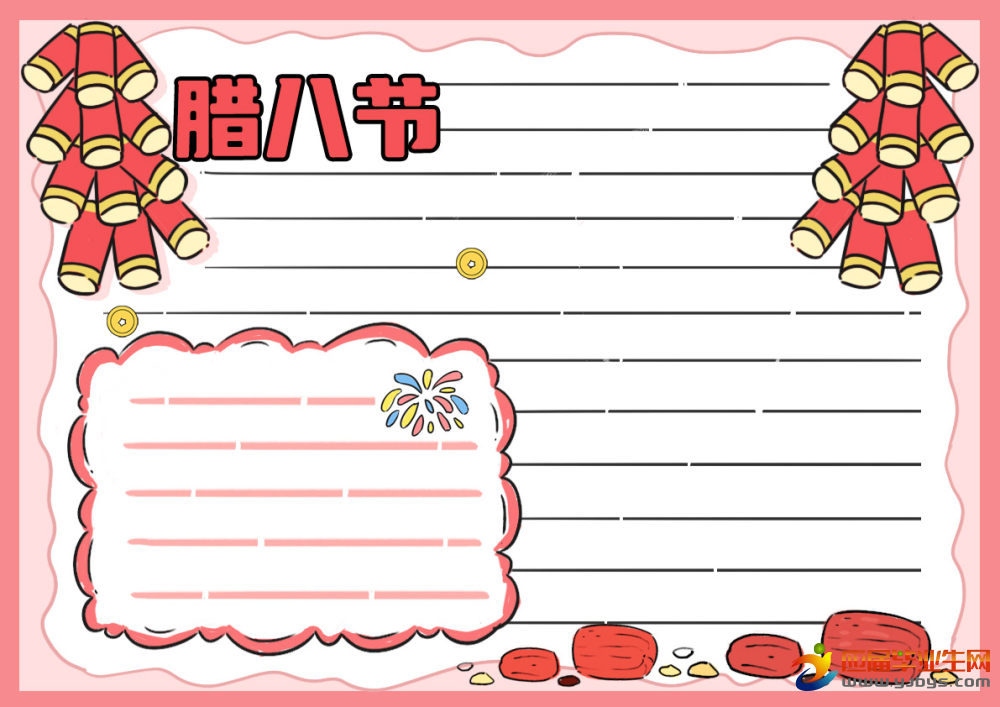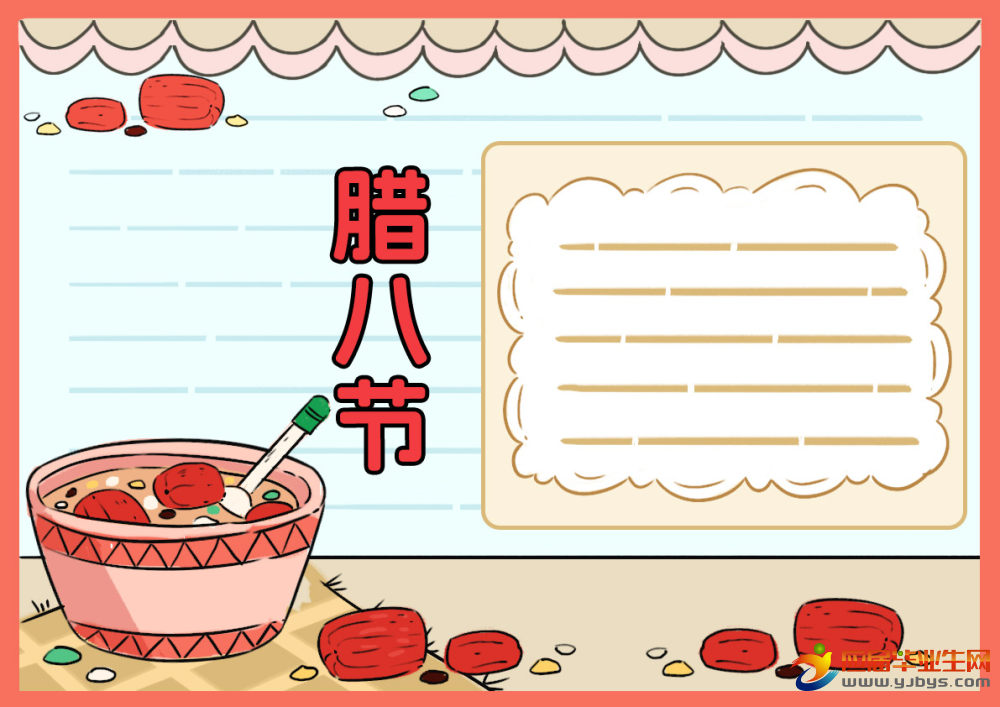- 相关推荐
中国腊八节手抄报
Origin
中国腊八节手抄报





起源
Laba is celebrated on the eighth day of the last lunar month, referring to the traditional start of celebrations for the Chinese New Year. La in Chinese means the 12th lunar month and ba means eight.
腊八是农历十二月的第八天,是欢庆春节的开始。汉语里,“腊”的意思是第十二个月,“八”的意思是八。
Legends about the origin of this festivity abound. One holds that over 3,000 years ago sacrificial rites called La (腊) were held in the twelfth lunar month when people offered up their preys to the gods of heaven and earth. The Chinese characters for prey (猎) and the twelfth month (腊 La) were interchangeable then, and ever since La has been used to refer to both. Since the festival was held on the eighth day of the Last month, people later appended the number eight (ba in Chinese), giving us the current Laba.
关于这个节日的起源有很多种说法。有一种说法是大约3000年前,一种祭祀仪式叫做“腊”,会在农历十二月举行。人们向天上和地下的神献出他们的猎物。那时候,表示猎物的汉字“猎”和表示农历十二月“腊”是可以通用的。从那时候起,“腊”就用来指这两种意思了。因为这个节是在最后一个月的第八天举行的, 后来人们就加上了“八”,于是就有了现在的腊八。
Legend
传说
The eight-treasure porridge was first introduced to China in the Song Dynasty about 900 years ago.
八宝粥最开始出现是在900年前的宋朝。
Buddhism was well accepted in the areas inhabited by the Han Chinese, who believed that Sakyamuni, the first Buddha and founder of the religion, attained enlightenment on the eighth day of the twelfth month. Sutras were chantedin the temples and rice porridge with beans, nuts and dried fruit was prepared for the Buddha. With the passing of time the custom extended, especially in rural areas where peasants would pray for a plentiful harvest in this way.
那时候佛教已经被信奉佛祖释迦牟尼的汉族人广泛接受。传说佛祖在十二月初八受到教化。人们会为佛祖准备好有豆子、坚果和干果的大米粥,寺庙里也会唱起佛经。随着时间的推移,这种习俗就传播出去了,尤其在农村,会用花生煮粥祈祷一年的好收成。
There is, however, another touching story: When Sakyamuni was on his way into the high mountains in his quest for understanding and enlightenment, he grew tired and hungry. Exhausted from days of walking, he passed into unconsciousness by a river in India. A shepherdess found him there and fed him her lunch -- porridge made with beans and rice. Sakyamuni was thus able to continue his journey. After six years of strictdiscipline, he finally realized his dream of full enlightenment on the eighth day of the twelfth lunar month. Ever since, monks have prepared rice porridge on the eve and held a ceremony the following day, during which they chant sutras and offer porridge to Buddha. Thus, the tradition of eating Laba porridge was based in religion, though with the passing of time the food itself became a popular winter dish especially in cold northern China.
另外还有一个感人的故事:释迦牟尼在去深山求得理解和教化的路上又饿又累。由于连日走得精疲力竭,他在印度的一条河边不省人事。一个牧羊女发现了她,把自己的午餐——用豆子和大米做的粥——给他吃了。释迦牟尼因此得以继续他的旅程。经过六年严格的修行之后,他终于在农历十二月初八悟到了自己充满启示的梦。从 那时起,僧人们就要在腊八前夜准备米粥,在第二天举行一个仪式,他们要唱着佛经献粥给佛祖。因此,吃腊八粥的传统其实是源于宗教的,虽然随着时间的流逝,这种食物本身就成了冬日的`一道美食,尤其在寒冷的中国北方。
According to written records, large Buddhist temples would offer it to the poor to show their faith to Buddha. In the Ming Dynasty about 500 years ago, it became such a holy food that emperors would offer it to their officials during festivals. As it gained favor in the feudal upper class, it also quickly became popular throughout the country.
根据有记载的历史,大的佛寺要向穷人施粥以显示对佛祖的信仰。在距今500年前的明朝,腊八粥变成了神圣的食物,就连皇帝也要在过节的时候赐粥给群臣。在封建上层社会的推动下,腊八粥迅速风靡全国。
【中国腊八节手抄报】相关文章:
腊八节手抄报07-05
关于腊八节的手抄报07-07
腊八节手抄报内容12-30
腊八节手抄报资料07-06
关于腊八节手抄报07-06
初中腊八节手抄报07-06
简单的腊八节手抄报07-06
腊八节手抄报图片07-07
2016腊八节手抄报07-07